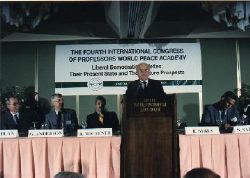Shils, Edward
| Line 43: | Line 43: | ||
==Major Works== | ==Major Works== | ||
| + | * ''Toward a General Theory of Action''. with Talcott Parsons. Harvard University Press, 1951. | ||
| + | * ''The Torment of Secrecy: The Background and Consequences of American Security Policies''. The Free Press, 1956. | ||
| + | * ''The Intellectual Between Tradition and Modernity: The Indian Situation''. Mouton, 1961. | ||
| + | * ''Theories of Society: Foundations of Modern Sociological Theory''. with Talcott Parsons, Kaspar D. Naegele, and Jesse R. Pitts. The Free Press of Glencoe, Inc., 1961. | ||
| + | * ''The Constitution of Society''. University of Chicago Press, 1972. | ||
| + | * ''The Intellectuals and the Powers, and Other Essays'' (Selected Papers Volume 1). University of Chicago Press, 1972. | ||
| + | * ''Center and Periphery: Essays in Macro-sociology'' (Selected Papers Volume 2). University of Chicago Press, 1975. | ||
| + | * ''The Calling of Sociology and Other Essays on the Pursuit of Learning'' (Selected Papers Volume 3). University of Chicago Press, 1980. | ||
| + | * ''Tradition''. University of Chicago Press, 1981. | ||
| + | * ''The Calling of Education: "The Academic Ethic" and Other Essays on Higher Education''. The University of Chicago Press, 1997. | ||
| + | * ''The Virtue of Civility: Selected Essays on Liberalism, Tradition, and Civil Society''. Liberty Fund Inc., 1997. | ||
| + | * ''Order of Learning: Essays on the Contemporary University''. Transaction Publishers, 1997. | ||
| + | * ''Portraits: A Gallery of Intellectuals''. Joseph Epstein (ed.). University of Chicago Press, 1997. | ||
| + | * ''A Fragment of a Sociological Autobiography: The History of My Pursuit of a Few Ideas''. Transaction Publishers, 2006. | ||
| + | |||
| − | |||
| − | |||
| − | |||
| − | |||
| − | |||
| − | |||
| − | |||
| − | |||
| − | |||
| − | |||
| + | *''Theories of Society: Foundations of Modern Sociological Theory, Two Volumes in One,'' with [[Jesse R. Pitts]], [[Talcott Parsons]] (Editor), & Kaspar D. Naegele, New York: The Free Press (1961) | ||
==Notes== | ==Notes== | ||
Revision as of 23:38, 6 November 2020
| Western Philosophy 20th-century philosophy | |
|---|---|
 | |
| Name: Edward Albert Shils | |
| Birth: July 1 1910[1] Springfield, Massachusetts [2][3] | |
| Death: January 23 1995 (aged 84) Chicago | |
| School/tradition: | |
| Main interests | |
| sociology, social philosophy | |
| Notable ideas | |
| Role of intellectuals in society | |
| Influences | Influenced |
| Max Weber, Louis Wirth, Talcott Parsons | Talcott Parsons, Saul Bellow, Joseph Epstein, Jerzy Zubrzycki |
Edward Albert Shils (1 July 1910 – 23 January 1995) was a Distinguished Service Professor in the Committee on Social Thought and in Sociology at the University of Chicago and an influential sociologist. He was known for his research on the role of intellectuals and their relations to power and public policy. His work was honored in 1983 when he was awarded the Balzan Prize. In 1979, he was selected by the National Council on the Humanities to give the Jefferson Lecture, the highest award given by the U.S. federal government for distinguished intellectual achievement in the humanities.[4]
Life
Edward Shils grew up in Philadelphia, where he went to high school.[3] Though he taught sociology and social thought, he did not have a formal degree in those fields. His undergraduate degree, from the University of Pennsylvania, was in French literature. He came to the attention of Louis Wirth, a distinguished sociologist at the University of Chicago, who hired Shils as a research assistant. Thereafter, Shils became recognized as an outstanding teacher in the field of sociology. His knowledge of the literatures of numerous cultures and fields was deemed to be impressive. He taught sociology, social philosophy, English literature, history of Chinese science and other subjects.
Shils married the historian Irene Coltman in England towards the end of 1951.[5] Edward Shils and Irene Coltman had a son. They divorced. Shils died in January 1995. He was survived by his son and daughter-in-law, Adam and Carrie Shils of Chicago; a grandson, Sam Shils; and a nephew, Edward Benjamin Shils, professor emeritus at the University of Pennsylvania[6] A large photo of Shils hangs in the Shils Reading Room at the University of Chicago's Social Science Research Building.
Career
A specialist in the works of Max Weber, he also translated the works of sociologist Karl Mannheim into English. He served with the British Army and the United States Office of Strategic Services during World War II. Upon returning to Chicago, he was appointed Associate Professor in 1947, and Professor in 1950. In 1971, he was named Distinguished Service Professor.
For many years, Shils held joint appointments at Chicago and other universities. He was: reader in sociology at the London School of Economics from 1946 to 1950; a fellow of King's College, Cambridge, from 1961 to 1970; a fellow of Peterhouse, Cambridge, from 1970 to 1978; and an honorary professor in social anthropology at the University of London from 1971 to 1977. He was named an honorary fellow at the London School of Economics in 1972 and an honorary fellow at Peterhouse in 1979. He was also a professor at the University of Leiden from 1976 to 1977.
He attempted to bridge the research traditions of German and American sociology. At Chicago, he attracted leading European scholars to teach at the University, including Arnaldo Momigliano, Raymond Aron and the British sinologist Michael Loewe, among others. Professor Shils was a member of the American Academy of Arts and Sciences and the American Philosophical Society.
Shils had a fraught relationship with Saul Bellow, a colleague at the University of Chicago who also served on the Committee on Social Thought. Shils served as his "mentor, character model and editor" and figures prominently in many of Bellow's novels, including Mr. Sammler's Planet (Artur Sammler), Humboldt's Gift (Professor Durnwald), and Ravelstein (Rakhmiel Kogon). Artur Sammler and Professor Durnwald are both described glowingly, but in Ravelstein the Shils character is treated with "animosity [that] reaches lethal proportions" following a falling out between the two.[7]
Legacy
Major Works
- Toward a General Theory of Action. with Talcott Parsons. Harvard University Press, 1951.
- The Torment of Secrecy: The Background and Consequences of American Security Policies. The Free Press, 1956.
- The Intellectual Between Tradition and Modernity: The Indian Situation. Mouton, 1961.
- Theories of Society: Foundations of Modern Sociological Theory. with Talcott Parsons, Kaspar D. Naegele, and Jesse R. Pitts. The Free Press of Glencoe, Inc., 1961.
- The Constitution of Society. University of Chicago Press, 1972.
- The Intellectuals and the Powers, and Other Essays (Selected Papers Volume 1). University of Chicago Press, 1972.
- Center and Periphery: Essays in Macro-sociology (Selected Papers Volume 2). University of Chicago Press, 1975.
- The Calling of Sociology and Other Essays on the Pursuit of Learning (Selected Papers Volume 3). University of Chicago Press, 1980.
- Tradition. University of Chicago Press, 1981.
- The Calling of Education: "The Academic Ethic" and Other Essays on Higher Education. The University of Chicago Press, 1997.
- The Virtue of Civility: Selected Essays on Liberalism, Tradition, and Civil Society. Liberty Fund Inc., 1997.
- Order of Learning: Essays on the Contemporary University. Transaction Publishers, 1997.
- Portraits: A Gallery of Intellectuals. Joseph Epstein (ed.). University of Chicago Press, 1997.
- A Fragment of a Sociological Autobiography: The History of My Pursuit of a Few Ideas. Transaction Publishers, 2006.
- Theories of Society: Foundations of Modern Sociological Theory, Two Volumes in One, with Jesse R. Pitts, Talcott Parsons (Editor), & Kaspar D. Naegele, New York: The Free Press (1961)
Notes
- ↑ Social Security Death Index
- ↑ Edward Shils at the Leiden University "faculty since 1575" site.
- ↑ 3.0 3.1 Ann T. Keene , Shils, Edward Albert at American National Biography Online, Sept. 2005
- ↑ "Jefferson Lecture in the Humanities", National Endowment for the Humanities website (retrieved January 22, 2009).
- ↑ Index entry. FreeBMD. ONS. Retrieved 10 November 2018.
- ↑ "Service for Edward Shils", Chicago Chronicle, 30 March 1995
- ↑ "Mr. Bellow Writes On, Wrestling With the Ghost of Edward Shils", New York Times, 22 April 2000.
ReferencesISBN links support NWE through referral fees
- Joseph Epstein, My Friend Edward
- Zubrzycki, Jerzy (Jan–Feb 1996). Edward Shils – a personal memoir. Quadrant 40 (1–2): 61–63.
External links
All links retrieved
- Obituary: Edward Shils, Committee on Social Thought, Sociology Chicago Chronicle, February 2, 1995.
- In memoriam: Edward Shils, 1910-1995 by H.R. Trevor-Roper, The New Criterion.
- Editor's Notes re Shils University of Chicago Magazine, June 1997.
- Edward Shils International Balzan Prize Foundation.
- Remembering Edward Shils by Joseph Epstein, Commentary, October, 2019 .
Credits
New World Encyclopedia writers and editors rewrote and completed the Wikipedia article in accordance with New World Encyclopedia standards. This article abides by terms of the Creative Commons CC-by-sa 3.0 License (CC-by-sa), which may be used and disseminated with proper attribution. Credit is due under the terms of this license that can reference both the New World Encyclopedia contributors and the selfless volunteer contributors of the Wikimedia Foundation. To cite this article click here for a list of acceptable citing formats.The history of earlier contributions by wikipedians is accessible to researchers here:
The history of this article since it was imported to New World Encyclopedia:
Note: Some restrictions may apply to use of individual images which are separately licensed.
